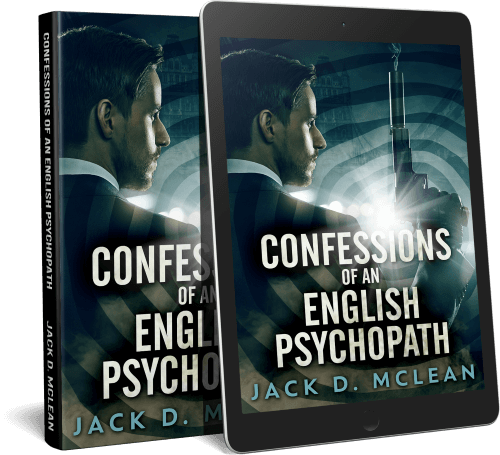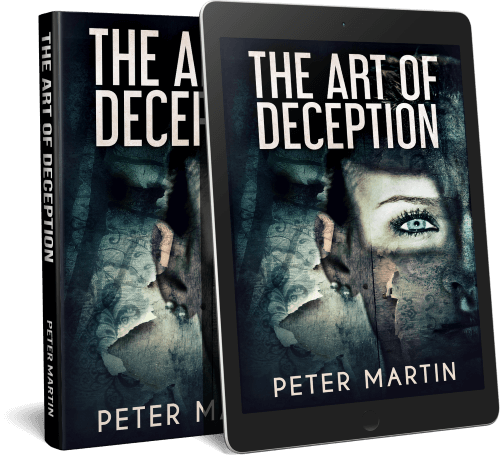Confessions Of An English Psychopath
Book excerpt
Chapter 1: The Men Who Stare at Goats
I committed my first multiple murder at the age of six. I’d read somewhere that insects don’t feel pain, and I decided to put that theory to the test. My experimental equipment consisted of a pair of tweezers, a lighted candle, and twenty longhorn beetles.
Contrary to what the theory predicted, the beetles writhed in agony, or at the very least severe discomfort, as I gripped them tightly between the tweezers and held them over the candle flame until all twenty of them were well and truly roasted.
The experiment was so enjoyable that I repeated it several times, but after a while it lost its appeal. It was clear that I was ready for bigger things.
----o0o----
I killed my first mammal by accident.
Almost.
My parents took me on holiday to Garreg Goch Farm, a dismal caravan site in North Wales. The caravan owner on the pitch next to ours had a large dog which was tethered to the wheel of his van by a long chain. One day I approached our family caravan from the wrong direction and found myself face to face with the snarling brute. It showed every intention of biting lumps out of me. Luckily I was carrying a cricket bat and I stopped it in its tracks with a forward defensive stroke to the snout. I could possibly have fled to safety at that point, but instead I executed an imperious cover drive to the side of its head which knocked its brains to Kingdom Come.
The dog’s owner, who was somewhat anti-social, emerged from his van at speed to remonstrate with me. I burst into tears (something I had learnt could work to my advantage) but this didn’t pacify him. He walloped me hard with his calloused workman’s hands.
Later that day his caravan burnt to the ground in a freak accident while he was taking his afternoon nap. He was lucky to escape with his life and spent the rest of his holiday recovering in the burns unit of the Garreg Goch hospital.
----o0o----
After leaving school, I went to King’s College in London to study medicine.
I would have preferred to study art, but lacked the talent to do so. The only time I’d ever wielded a paintbrush to good effect was when I’d sharpened the wooden handle into a stiletto point.
I confess I had little interest in medicine, other than for the opportunities it gave me to play with cadavers. During my three years at medical school I probably socialized as much with the dead as with the living. Sometimes it was hard to tell them apart. At any rate it left little time for academic study.
In my final year, it became clear that my tutors thought I deserved to fail my course, so I invited myself to their homes late at night to take a viva with them in the hope of improving my grades. I introduced them to some novel study materials including a roll of gaffer tape, an oil lamp, and an electric cattle prod. My representations were so eloquent that I graduated well ahead of my peers with a first-class honours degree.
----o0o----
When I left university I took a stopgap job working in a slaughterhouse. My talents with a bolt-gun were soon noted, and before long I became the go-to slaughter-man whenever there was a fresh consignment of cattle. The more the merrier, as far as I was concerned.
Bolt guns are meant to completely stun cattle, but judging by the way that some of them twitched, that isn’t always the case.
----o0o----
One day during the long train journey home from my place of work, I was reading the Times newspaper when I came across a small advertisement in the classifieds.
“Death was the birth of him. Interesting opportunity for self-reliant individual. Send your C.V. to Box no 452.”
That evening I put together a C.V. and posted it to the box number.
A few days later I was watching television when the telephone rang.
“Mr. Odd?”
“Speaking,” I said.
“You responded to an advertisement we placed in the classified section of The Times newspaper.”
“Yes, that’s correct.”
“We would like to see you to discuss the matter further. When are you available for a meeting?”
“I’m prepared to be flexible.”
“Splendid. Could we say tomorrow morning at 9.30 a.m.?”
“That would be ideal.”
“We’re operating from a house in the suburbs. Forty-four Regency Drive in Greenwich.”
“I’ll be there tomorrow at 9.30.”
“Good show. We’re very much looking forward to seeing you.”
The next morning I called the slaughterhouse and explained that I was sick with a mystery virus. Then I polished my shoes, put on my only suit, and made my way by tube from my home in Notting Hill to North Greenwich, where I boarded a bus.
When I alighted at Regency Drive, I discovered that number forty-four did not exist. The even numbers only went up to forty-two, and the odd to forty-one.
As I stood at the end of the street contemplating my next move, a car pulled up next to me: an old-fashioned Rolls-Royce with a man in a chauffeur’s outfit in the driving seat. He wound down the window, leaned out of it, and said:
“Mr Odd.”
“That’s me.”
“Get in the back.”
I entered the rear of the car and closed the door. There were dark glasses on the seat next to me.
“See that pair of spectacles?” Said the chauffeur. “I’m going to have to ask you to put them on.”
“Why?” I asked.
“Procedure, that’s all. If you want to be considered for the job, you’ll do it.”
I picked up the dark glasses and did as he said. They were opaque and designed to wrap around the head so as to cut off my peripheral vision as well as my view straight ahead and were highly effective. I was plunged into near total darkness and could see nothing worth seeing.
“Keep them on until you’re told you can take them off.”
I felt the car pulling away from the pavement and played the game of trying to work out how many corners we took during our journey, and whether they were left or right, but soon lost track. When the vehicle eventually stopped, I had no idea where we might be.
I heard the chauffeur opening the door at my side, so I unfastened my seat belt and climbed out. He took me by the arm and led me like a blind man over some paving stones then up a gravel path. A doorbell rang with a Westminster Chime, and I was aware of being led into a hall. A door closed behind me.
“You can remove the eyewear now.”
I took off the dark glasses and found myself in the entrance hall of a large house. Standing in front of me there was a middle aged man wearing a navy pinstriped suit.
“Please give me the glasses,” he said, so I handed them over.
“I’m here for a meeting,” I told him. “My name is Lawrence Odd.”
“Indeed. Follow me.”
He showed me into a room that looked just like the front room of any suburban house.
“Please take a seat. Someone will be with you in a moment.”
I sat on one of the two sofas available, and stared through the net curtains covering the windows, looking for clues as to where I was. All I could see was a tree-lined garden with rolling lawns and in the distance a high stone wall.
After a while, another middle aged man appeared, equipped with a clipboard and pen.
“Mr Odd, my name is Brian Jepson. Please call me Brian. I’m here to take you through the first stage of the selection process. I’ll ask you a few questions, if I may.”
“Please do, and please call me Lawrence.”
“Thank you. I understand that you are an orphan, Lawrence.”
“How do you know that? It’s not mentioned in my C.V.”
“We’ve made some enquiries about you.”
“I see. Well your information is quite correct. My parents died while I was in my late teens. They were a great loss to me. I loved them both dearly. I’ve had to rely on my own resources since they passed away.”
He smiled approvingly.
“Quite. You seem to have done very well for yourself, considering. You graduated with a first class honours degree in medicine. That must have taken some hard work.”
“There were occasions when I had to burn the midnight oil, so to speak.”
He nodded, as if he understood what burning the midnight oil involved. I doubted very much that he did.
“Did you enjoy your time at university Lawrence?”
“Very much so; I took to the academic lifestyle like a duck to water, and fortunately my parents, who were poor as church mice, had had the foresight to invest in some Life Insurance policies which paid out enough money to get me through my course without having to worry about finances. I like to think that they would have been pleased with the way that I used my modest inheritance.”
“I’m sure they would have been. Very few people graduate in any subject with results like yours, let alone in medicine. Indeed, we were surprised that you replied to our advertisement. People with your abilities almost always enter the medical profession and become highly paid consultants. Have you decided against becoming a Doctor?”
“I have. I’m not sure yet what I’m going to do, but I need broader horizons than a city-centre hospital or a GP’s practice in a leafy suburb.”
“Well you’ve come to the right place. We can promise you broad horizons, all right. Now before we go any further, I have a document that needs your attention. I’d like you to read it carefully then sign it at the foot in the space provided, if you wish to continue being involved in the selection process.”
















Praesent id libero id metus varius consectetur ac eget diam. Nulla felis nunc, consequat laoreet lacus id.